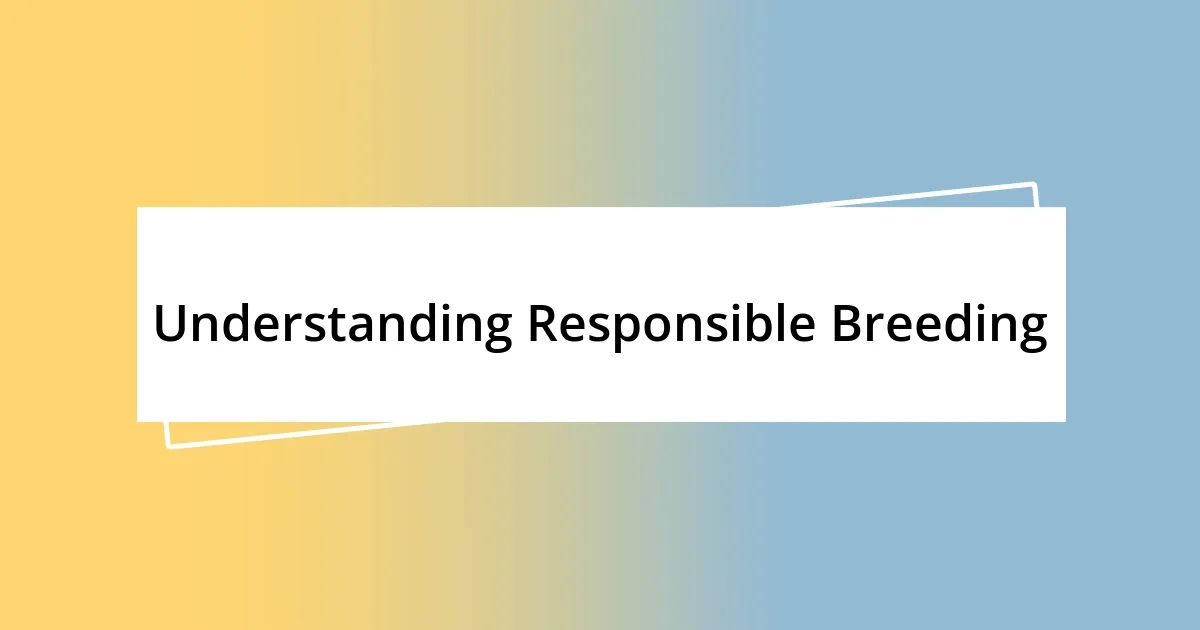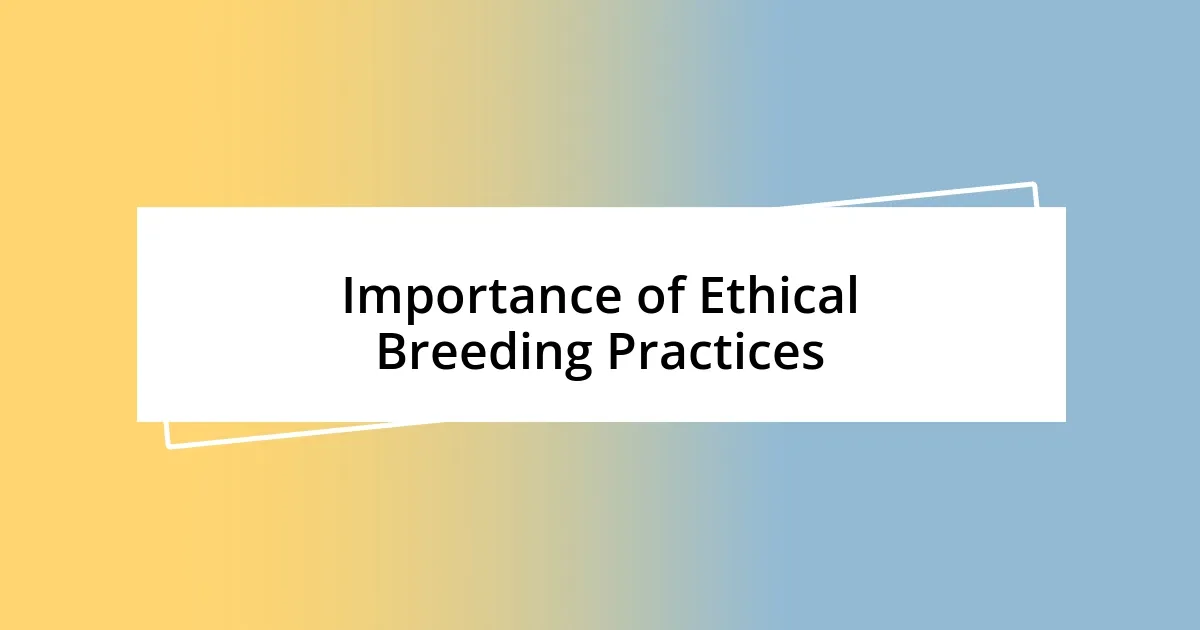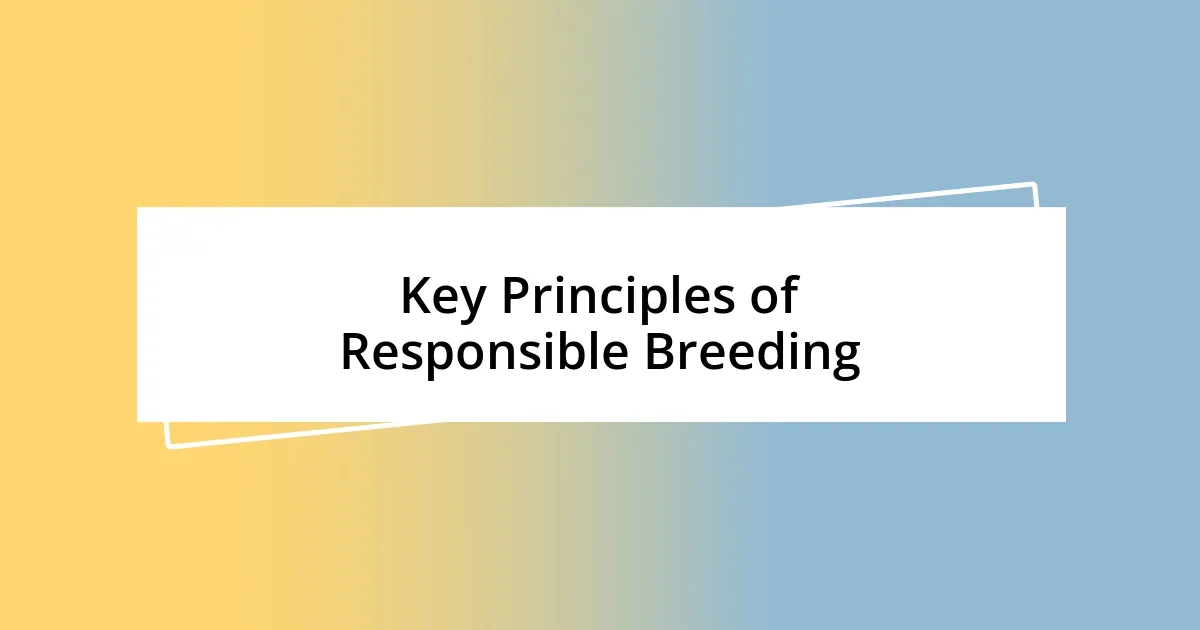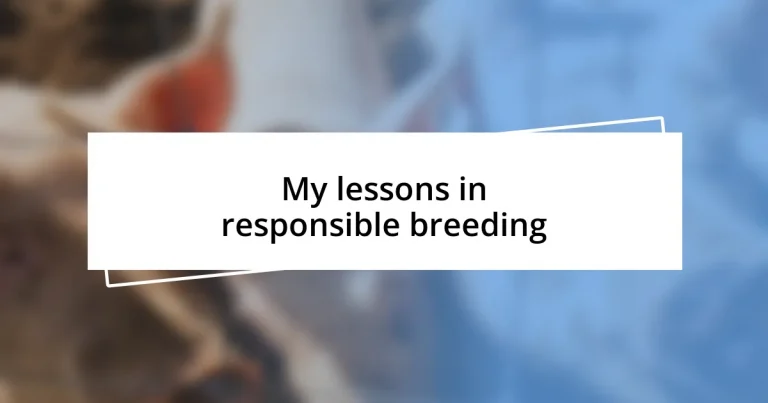Key takeaways:
- Responsible breeding encompasses a commitment to animal welfare, understanding genetics, and prioritizing health over appearance.
- Ethical breeding practices involve transparency, responsible placement, and ongoing education to support new puppy owners and enhance the breed.
- Selecting healthy breeding stock requires considering both physical traits and personality, along with genetic testing for better outcomes.
- Creating a breeding plan and assessing long-term commitments ensure that puppies are raised responsibly, setting them up for successful lives in their future homes.

Understanding Responsible Breeding
Responsible breeding is about much more than just producing puppies; it involves a deep commitment to the animals and the future of that breed. I remember my first litter: I was full of excitement but soon realized the weight of my responsibility. Each puppy was a reflection of my breeding choices, and I knew I had to ensure they would have healthy, happy lives. Have you ever considered how your decisions can affect not just one animal, but an entire lineage?
One important aspect of responsible breeding is understanding genetics. I’ve often delved into pedigree charts, and it’s like a fascinating puzzle. When I first faced potential genetic issues in my line, it was eye-opening. I had to make tough choices to prioritize health over looks, and it made me appreciate the ethics of breeding on a much deeper level. How often do we stop to think about the long-term implications of our choices?
Another crucial point is the importance of socialization. I vividly recall the joy of seeing each puppy explore their environment for the first time, and it struck me how vital these early experiences are. Providing a nurturing and stimulating environment while they’re young shapes their behavior for life. Have you ever watched a timid puppy transform into a confident companion because of proper socialization? It’s incredibly rewarding and underscores the role we play in their development.

Importance of Ethical Breeding Practices
Ethical breeding practices are essential for the well-being of both the animals and the broader breeding community. I’ve experienced the profound impact that ethical decisions can have on the lineage of each puppy I raise. For instance, when I chose to halt breeding from a dog with a known genetic issue, it was difficult, yet I knew that preserving the health of future generations was far more important than a fleeting desire for one more litter.
Here are some key factors that underline the importance of ethical breeding practices:
- Health Focus: Prioritizing health over appearance helps eliminate hereditary health issues, ensuring that puppies lead long, healthy lives.
- Social Responsibility: Ethical breeders contribute positively to the breed’s reputation and sustainability by avoiding overbreeding and ensuring suitable homes for each puppy.
- Knowledge and Education: Staying informed about the latest in genetics and breeding practices fosters a culture of responsible breeding among peers, benefiting everyone involved.
- Support for New Owners: Providing guidance and resources to new puppy owners promotes responsible pet ownership, ultimately leading to better lives for the dogs and their families.
Each of these points resonates deeply with me, as they not only reflect a commitment to ethical standards but also enhance the joy of the journey in breeding.

Key Principles of Responsible Breeding
Responsible breeding involves key principles that guide ethical practices and enhance the lives of the dogs involved. One fundamental principle I’ve always adhered to is transparency. When I place a puppy into a new home, I provide the new owners with detailed information about the puppy’s lineage, potential health risks, and overall care requirements. It’s incredible to see how much peace of mind this transparency brings to families. Have you ever felt reassured by knowing exactly what to expect from your pet? For me, it solidifies the bond we create with the new owners.
Another crucial element is responsible placement. I vividly recall the process of finding homes for my puppies—it was both exciting and nerve-wracking. Each decision involved evaluating numerous factors, such as the lifestyle of the potential families and their commitment to training and socialization. I’ve turned down great offers because the fit didn’t feel right. Every time, I reminded myself that my responsibility doesn’t end when the puppies leave; it extends into their futures. How often do we reflect on the long-term well-being of the dogs we breed?
Finally, I can’t stress enough the importance of continuous education in this field. Regardless of how experienced you become in breeding, there’s always more to learn. I remember attending a seminar on the latest advancements in genetic testing and being completely inspired. These insights not only expanded my knowledge but also equipped me with the tools to make informed decisions. What ways have you found to enhance your understanding of breeding? For me, staying updated is a commitment to quality and ethical responsibility.
| Key Principle | Description |
|---|---|
| Transparency | Providing detailed information about a puppy’s lineage and health risks to potential owners. |
| Responsible Placement | Evaluating potential homes to ensure suitable matches for each puppy’s needs and lifestyle. |
| Continuous Education | Staying informed about breeding practices and genetic advancements to enhance decision-making. |

Selecting Healthy Breeding Stock
Selecting healthy breeding stock is undoubtedly one of the most critical aspects of responsible breeding. I remember visiting a breeder’s facility early in my journey. They had a rigorous health screening process in place, which included checking for common genetic disorders. Witnessing this firsthand made me realize the importance of such measures. It’s not just about finding a cute dog; it’s about investing in the future health of the breed. How can we truly embrace the joy of breeding if we don’t prioritize the health of our dogs?
When I consider which dogs to breed, I look beyond just their physical traits. Personality plays a vital role, and I’ve seen how temperamental issues can arise in offspring. In my experience, a calm and affectionate parent usually produces puppies that exhibit those same qualities. Can you imagine raising a litter filled with anxiety and nervousness? It’s heartbreaking to witness, and it drives home the need for careful selection. For me, fostering a warm and stable environment is essential, as I want to raise puppies that will thrive in their new homes.
Genetic testing has been an absolute game-changer in this process. I recall a specific case where I opted for genetic testing before breeding. The results revealed potential vulnerabilities that I had never anticipated. This invaluable information not only guided my decisions but also prevented future heartache for the families waiting to adopt. Don’t you think that having such tools at our disposal empowers us to be better breeders? By thoroughly understanding the genetics involved, we can make choices that truly enhance the breed, ensuring healthier and happier lives for our puppies.

Creating a Breeding Plan
Creating a breeding plan is essential for ensuring that you breed responsibly and ethically. I like to think of it as crafting a roadmap for the future of your puppies. When I first embarked on this journey, I was overwhelmed by the details, but I quickly learned that laying out a clear plan helps streamline decision-making and aligns your breeding goals with your values.
One technique I use is setting specific objectives for each breeding. This includes considering traits I want to emphasize or potential health concerns I want to mitigate. I vividly recall a particular breeding experiment where I aimed to enhance temperament while addressing a common health issue in the breed. The thoughtful pairing paid off—not only did I see better socialization in the puppies, but their health results exceeded my expectations. Have you ever felt that exhilaration when your plans come to fruition? It’s incredibly rewarding.
Moreover, I ensure my breeding plan incorporates timelines for health screenings and assessments for both the sire and dam. I remember a time when I didn’t account for timing properly, and I lost valuable months waiting for results. This taught me that every moment counts in breeding. By establishing a timeline and sticking to it, you can create a supportive environment for expectant mothers and their litters, laying the groundwork for healthy growth and development. Planning effectively not only leads to better outcomes but creates a sense of assurance that you’re doing everything possible for your dogs. Doesn’t that sense of responsibility resonate strongly with anyone who has loved a pet?

Raising Puppies Responsibly
Raising puppies responsibly starts long before they arrive. I always spend time getting to know the mother’s personality during her pregnancy. It’s come to mean so much to me—watching her behaviors can give me clues about how the puppies will develop. Just thinking back to a previous litter, the serene and nurturing nature of their mom translated into puppies that were calm and well-adjusted. Can you imagine the joy of seeing a whole litter play gently? It makes all the effort worthwhile.
Socialization is another cornerstone of responsible puppy raising. I begin exposing the puppies to various sounds, people, and environments shortly after they’re mobile. There was one particular puppy in a past litter, let’s call her Bella, who was shy at first. By gradually introducing her to new experiences, she blossomed into a confident little companion. I can’t emphasize enough how important these early experiences are. Without them, we risk raising puppies who struggle to adapt to the world around them.
Feeding and nutrition play a vital role too. From my own experience, I’ve learned that quality kibble and the right supplements can significantly impact a puppy’s growth. I remember switching one litter to a better brand, and the difference was astonishing. Their coats became shinier, and energy levels soared! It’s these subtle yet crucial changes that can set our puppies up for success. As a responsible breeder, what can be more gratifying than knowing you’re providing the best foundation for their lives?

Assessing Long-Term Commitments
Assessing long-term commitments in breeding is essential for ensuring every puppy receives the care and attention it deserves. I remember the moment I realized that breeding isn’t just about producing a litter; it’s about influencing lives. This insight shifted my perspective completely, making it clear that my responsibilities spanned well beyond the whelping box.
Have you ever paused to consider the aftermath of your breeding decisions? I certainly have. It’s easy to get swept up in the excitement of new puppies, but a responsible breeder must also think about the long-term implications. Each puppy represents a potential lifelong bond with their future family. Reflecting on one of my past litters, I felt an overwhelming sense of pride knowing that those puppies would thrive in the right homes, thanks to the groundwork I laid, emotionally and physically.
I’ve learned that evaluating the capabilities to support these puppies throughout their lives is crucial. For instance, one time I overlooked the importance of post-adoption support, and it hit me hard when a puppy was returned due to behavioral issues. It made me realize that my commitment doesn’t just end with the sale; it extends into the relationship with the new owners. Providing resources, guidance, and a support network can be transformative—not just for the puppy but for the family who will cherish them. How can we call ourselves responsible if we don’t ensure our puppies have the best chance at a thriving life?













